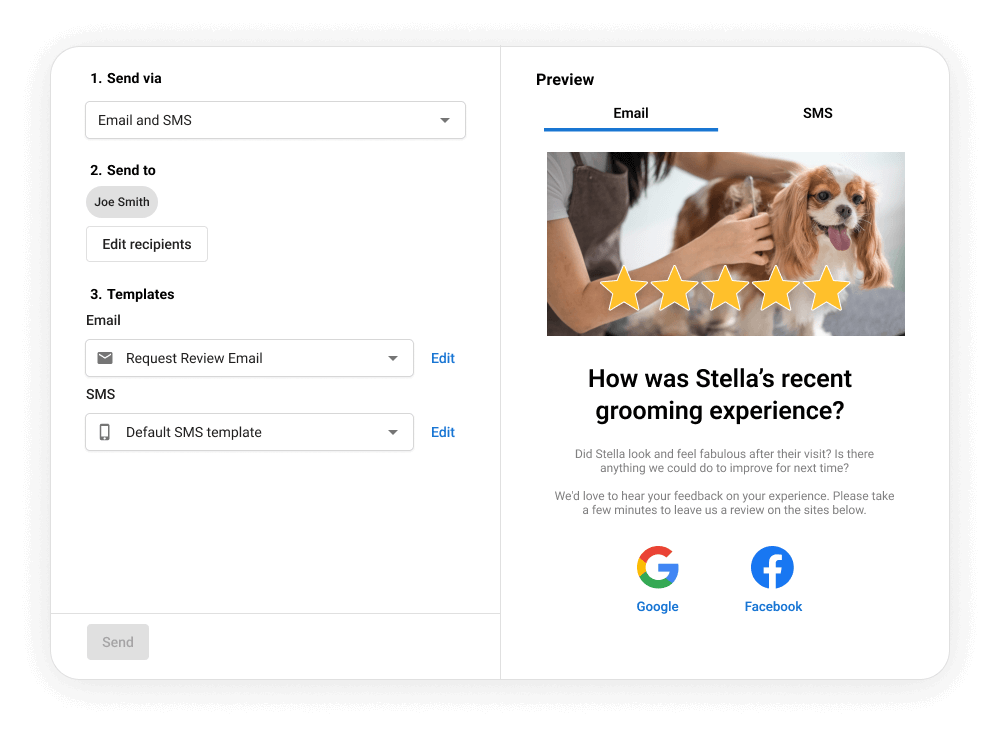
Mastering Small Business Reputation Management: From Crisis to Success
Let’s be honest, it is a jungle out there, and your small business’s reputation management needs to be king. Unlike the bigger guys that can take a punch or two, one bad review or a single viral post can topple a small business faster than you can say “Jumanji.” With potential customers sniffing around every corner, scrutinizing your reviews, and social media, maintaining a top-notch online presence isn’t just important—it’s essential.
Welcome to your ultimate guide on small business reputation management, where we’ll spill the deets on everything from gauging your current standing to whipping your online image into shape.
Whether you’re running a landscaping business, a spotless cleaning service, or any business aiming to stay on top of the competition, mastering small business reputation management is your ticket to transforming a crisis into a success story.
Ready to turn your reputation into your secret weapon? Let’s dive in and unleash your business’s true potential!
Automatically request reviews to amplify your online reputation
The Importance of Reputation Management for Small Businesses
Reputation management is key for any business, but it’s especially important for small businesses. With all the PR nightmares out there on TikTok and X, it is becoming very apparent that our online presence significantly impacts how potential customers perceive our businesses.
What we’re trying to get across is that good reputation management habits can lead to increased trust and customer loyalty, while a poor reputation can drive customers away. You don’t want that, and we don’t want that for you. So, let’s look at a few ways proactive small business reputation management is worth doing:
Key Benefits of Proactive Reputation Management
Improved Customer Trust
One of the great benefits of reputation management are customers are more likely to trust businesses with positive reviews and a good online presence.
For instance, a small bakery that consistently receives praise for its delicious pastries and friendly service is more likely to attract new customers than one with mixed reviews.
Increased Visibility
A strong reputation can improve your search engine ranking on sites like Google and Bing, making it easier for customers to find you.
For example, a solar panel installation company with numerous positive reviews on Google is more likely to appear in the top search results when someone searches for “best solar panels near me” versus a contractor that has only a handful.
Competitive Advantage
We get it, standing out in a crowded market can be very challenging, but a well-managed reputation can give you the edge you need.
Imagine two nearby yoga studios: one with glowing reviews about its serene environment and experienced instructors, and another with no reviews at all. The studio with positive feedback is definitely more likely to attract new clients.
Also see: Reputation Management Examples
Understanding Your Online Presence
Before you can manage your reputation, you need to understand your current online presence. Conduct a comprehensive audit to see what customers are saying about you and where your business appears online. Here’s where you should start:
Steps for Conducting an Online Audit
Step 1: Search for Your Brand
Look up your business on major search engines like Google. Pay attention to search results, the Knowledge Graph, and the People Also Ask sections. For instance, a search for “Joe’s Pizza” might reveal reviews, social media profiles, and even mentions in local news articles.
Step 2: Check Review Sites
Visit popular review platforms like Yelp, Google Reviews, and industry-specific sites to see what customers are saying.
A local dental practice might find reviews on health-focused listing sites in addition to Google and Yelp.
Also see: Mastering Reputation Management for Dentists
Step 3: Monitor Social Media
Analyze your presence on social media platforms like Facebook, X, and LinkedIn. See how often your business is mentioned, shared, or reviewed.
For example, a boutique clothing store might find that their Instagram posts are frequently shared by fashion influencers multiple times a week.
Step 4: Use Monitoring Tools
Utilize tools like Google Alerts or Broadly’s reputation management services to keep track of online mentions. These reputation management tools can notify you whenever your business is mentioned online, helping you stay on top of your reputation.
Establishing a Strong Online Foundation
Building a strong online foundation is essential for effective reputation management. Start by claiming and optimizing your business profiles on major platforms.
Key Steps Establishing a Strong Online Foundation
Step 1: Claim Business Profiles
Ensure you have claimed your profiles on Google Business Profile, Bing Places, and relevant social media accounts like Facebook.
For example, people love photos of baked bread and desserts, so a local bakery would benefit from prioritizing profiles on Instagram, Yelp, Facebook, and Google Business Profile to engage with customers across these different platforms.
A Legal Practice, on the other hand, would probably benefit from maintaining a listing on professional sites like LinkedIn.
A roofing contractor? They should make sure to have their business listed prominently on Angi.
Step 2: Keep Information Consistent
Maintain consistency in your Name, Address, and Phone (NAP) information across all major influential platforms. This helps customers find you easily and improves your search engine ranking.
Step 3: Have a Professional Website
Create and maintain a professional website that reflects your brand well. Include essential information like your services, pricing (if applicable), contact details, and customer testimonials.
A well-designed website for a local spa, for instance, could feature images of the spa, a list of services, and an easy online booking process.
Step 4: Encourage Positive Reviews
Sometimes, our happy customers just need a little reminder. Using tools like Broadly’s review automation encourages satisfied customers to leave positive reviews—like this:
Proactive Reputation Building Strategies
To build a solid reputation in your local area, you need to be proactive. Enact strategies that encourage positive feedback and manage customer interactions effectively. Here’s how to ask for a review:
Encouraging and Managing Reviews
Solicit Reviews
Develop a process to regularly ask satisfied customers for reviews. Broadly’s small business reputation management features can streamline this process. How? For example, you can set up triggers to send automated text message review requests after a customer makes a transaction.
Respond Professionally
Always respond to reviews, both positive and negative, to show that you value customer feedback.
If a customer leaves a positive review about a restaurant’s excellent service, the owner should thank them. If someone leaves a negative review about a long wait time, the owner should apologize promptly and offer a solution to make things right, like a discount on their next order.
Content Marketing and Thought Leadership
Blogging and Guest Posting
Share valuable content through your blog and guest posts on other websites to establish your expertise and web reputation.
A local mechanic might write a blog post about car maintenance tips for their auto body business, or create a guest post on a prominent automotive website.
Social Media Engagement
Engage with your audience on social media by sharing informative content and responding to comments.
For instance, a pet grooming business might share pet care tips and answer followers’ questions about grooming in the comments section.
Community Involvement and Partnerships
Local Partnerships
Collaborate with local businesses and participate in community events to build a positive reputation.
For example, a coffee shop could partner with a local bakery on Valentine’s Day to offer joint promotions on a signature baked good and matching drink.
Employee Advocacy
The way a staff member talks about the business they work for speaks volumes. So, incentivize and encourage your employees to share positive content about your business online.
Fitness coaches at a local gym, for instance, might share their experiences and fitness tips on social media.
Handling Negative Feedback and Crisis Management
Negative feedback is inevitable, but how you handle it can make all the difference. Develop a crisis communication plan to address issues quickly and effectively. Here’s what you need to do:
Steps for Handling Negative Feedback
Step 1: Crisis Communication Plan
Have a plan in place to respond to negative reviews and comments promptly. For example, if a customer complains about a product defect on social media, respond immediately with an apology and offer to discuss the option of refund or replacement via email.
Step 2: Address Issues
Acknowledge the feedback given, apologize if necessary, and offer a solution. If a customer mentions slow service at a restaurant, for example, it’s always best to own up to your shortcomings and explain the steps you’ll be taking to improve.
Step 3: Push Down Negative Results
While we all wish we could magically delete reviews, one option you have at your disposal is to use positive reviews and content to push down negative search results.
Leveraging Technology for Reputation Management
Technology can significantly enhance your reputation management efforts. Broadly’s all-in-one platform, for example, offers tools for review management, social media, and customer communication with Web Chat and Inbox.
Useful tools you should test drive:
- Broadly: Manage reviews, social media, and customer interactions all from one easy-to-use dashboard.
- Yesware: Use Yesware for email tracking and analytics to improve customer communication. This can help you understand how customers are interacting with your emails.
Measuring and Analyzing Reputation Management Efforts
Regularly measuring and analyzing your efforts is important for ongoing improvement. Identify key performance indicators (KPIs) and use tools to track your progress along the way.
Important KPIs you should consider:
- Engagement Rates: Monitor how often customers interact with your content. High engagement rates indicate that your audience finds your content helpful.
- Follower Growth: Track the increase in your social media followers. Steady growth suggests that your reputation is improving over time.
- Conversion Rates: Measure the percentage of visitors who become paying customers. Higher conversion rates can indicate that your reputation management efforts are paying off.
Don’t forget to have Regular Audits
Conduct regular audits to review your reputation management strategy and make necessary adjustments. This can help you stay on top of trends and continuously improve your efforts.
Best Practices for Ongoing Reputation Management
Consistency and continuous improvement are key to maintaining a strong reputation.
Here are some best practices:
- Consistent Messaging: Ensure your brand messaging is consistent across all channels. This helps build a strong, recognizable brand.
- Employee Training: Train your employees on reputation management protocols. Well-informed employees can help maintain a positive reputation.
- Stay Updated: Keep up with industry trends and algorithm changes. This helps you adapt your strategies as needed.
- Customer Feedback: Use customer feedback to continuously improve your products and services. For example, if customers suggest a new product feature, consider implementing it.
Case Studies: Small Business Reputation Management Success Stories
Learn from real-world examples of small businesses that have successfully managed their online reputation strategy:
George Oren Tires
Atlas Heating & Air
By using these strategies and the right tools, small businesses can do a great job of managing their online reputation, building trust with customers, and achieving long-term success.
Transform your local business with revolutionary AI-powered software
